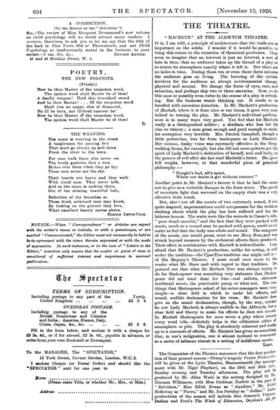THE THEATRE.
" MACBETH" AT THE ALDWYCII THEATRE. IT is, I am told, a prineiple of architecture that the voids are as important as the solids. I wonder if it would be possible to bring this axiom to the attention of theatrical producers. They seem to imagine that an interval is just an interval, a sort of hole in time, that an audience takes up the thread of a play or re-enters its atmosphere exactly where it left it. But them are no holes in time. During those ten or even those three minutes the audience goes on living. The lowering of the curtain Involves for the audience an abrupt environmental change, physical and mental. We change the focus of eyes, care, sod attention, and perhaps skip two or three centuries. Now, to do this once or possibly even twice in the course of a play is refresh- ing. But the business wants thinking out. It needs to be handled with conscious intention. In Mr. Hackett's production of Macbeth, where it is done nine or ten times, it goes very near indeed to ruining the play. Mr. Hackett's individual perform. once is in many ways very good. You feel that his Macbeth really is a distinguished soldier ; a ehiefiain who has led his elan to viotory ; a man great enough and good enough to make his corruption very horrible. Mrs. Patrick Campbell, though a little pedestrian, was far from inadequate as Lady Macbeth. Her curious, husky voice was extremely effective in the Sleep- walking Scene, for example, but she did not seem quiteto got the spirit of Lady Macbeth's dedication of herself, soul and body, to the powers of evil after she has read Macbeth's letter. She gave full weight, however, to that wonderful piece of practical philosophy :— " Nought's had, all's spent.
Where our desire is got without content."
Another point in Mr. Hackett's favour is that he had the sense not to give us a veritable Banque in the feast scene. The patch of uncertain light that wavered on the empty chair was a very effective little touch.
But, alas ! not all the merits of two extremely sound, if not quite inspired, impersonations could compensate for the ruthless slashing about which the play has here suffered and for the hideous lacunas. The waits were like the wounds in Caesar's side, "poor dumb mouths," and the fact that they were packed with music, much as a wound may be packed with gauze, could never make no feel that the body was whole and sound. The composer of the musio, one would guess, went to see Mary Rose, and was struck beyond measure by the orchestral effects there produced. Their effect in combination with Macbeth is indescribable. Ion afraid that Mr. Hackett's production, unlike his acting, is still under the tradition—the UpasTree tradition one might call it— of His Majesty's Theatre. I must recall once more to the reader what Mr. Shaw said with regard to that tradition. lie pointed out that what Sir Herbert Tree was always trying to do for Shakespeare was something very elaborate that Shakes peare did not want done for him—real rabbits, elaborate incidental music, the practicable pump or what not. The two things that Shakespeare asked of his actor-managers were very simple—a clear field in which to make his effects, and sound, audible declamation for his verse. Mr. Hackett does give us the sound declamation, though, by the way, neither he nor Lady Macbeth is always audible in the Aldwych, but clear field and liberty to make his effects he does not accord. In Macbeth Shakespeare for once wrote a play where ahuost every word tells—definitely helps in the edification either of atmosphere or plot. The play is absolutely coherent and works up to a crescendo of effects. Mr. Hackett has given us sometlung that, in one's indignation, one is almost inclined to remember as a series of dableaux effiants in a setting of indifferent IDOEic•
TAO.






































 Previous page
Previous page